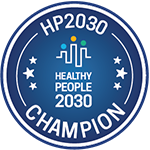
What You Need to Know About COVID-19 in 2025
According to the CDC, each year, respiratory viruses like COVID-19 are responsible for millions of illnesses and thousands of hospitalizations and deaths in the United States. The good news is there are actions you can take to help protect yourself and others from health risks caused by respiratory viruses.
How to protect yourself and others from COVID-19.
The CDC recommends these prevention strategies to protect yourself and others from COVID-19:
- Stay up to date with COVID-19 vaccines.
- Although vaccinated people sometimes get infected with the virus that causes COVID-19, staying up to date on COVID-19 vaccines significantly lowers the risk of getting very sick, being hospitalized, or dying from COVID-19.
- Practice good hygiene (practices that improve cleanliness such as washing your hands)
- Take steps for cleaner air
When you are sick:
- Use precautions to prevent spread, including staying home and away from others (including people you live with who are not sick) if you have respiratory symptoms.
- Learn when you can go back to your normal activities.
- Seek health care promptly for testing and/or treatment if you have risk factors for severe illness. Treatment may help lower your risk of severe illness, but it needs to be started within a few days of when your symptoms begin.
Know what’s happening in your community.
Visit the GNR Community Health Dashboard to get information on COVID-19 and other respiratory illnesses that affect your community.*
* As of January 1, 2025, COVID-19 is no longer a nationally notifiable disease. This means that individual COVID-19 cases are no longer required to be reported to the Georgia Department of Public Health or CDC and thus certain information will no longer be available
COVID-19 FAQs
What is COVID-19 & How is it Spread?
COVID-19, also known as coronavirus disease 2019, is a virus that causes fever, cough, and shortness of breath. While 80-85% of individuals infected with COVID-19 appear to have mild illness, the virus can cause severe illness including pneumonia in high risk populations like older adults and people who have chronic medical conditions. COVID-19 has affected a large number of people across multiple continents and is being transmitted simultaneously worldwide. The World Health Organization (WHO) declared COVID-19 a pandemic on March 11, 2020.
There are many different types of coronaviruses that are known to cause human illness. This virus is able to be passed person-to-person through respiratory droplets when an ill individual coughs, sneezes, or talks. Research also suggests that the virus is spread from person to person before an individual has symptoms. The virus can survive for a limited time on commonly touched surfaces.
COVID-19 is spread through respiratory droplets. The virus is thought to spread mainly from person-to-person.
- Between people who are in close contact with one another (within about 6 feet).
- Through respiratory droplets produced when an infected person coughs, sneezes or talks.
- These droplets can land in the mouths or noses of people who are nearby or possibly be inhaled into lungs
- Studies have suggested that COVID-19 may be spread by people who are not showing symptoms
What are the symptoms of COVID-19?
While not everyone with COVID-19 experiences symptoms, the most common symptoms of COVI-19 are:
- Fever or chills
- Cough
- Shortness of breath or difficulty breathing
- Fatigue
- Muscle or body aches
- Headache
- New loss of taste or smell
- Sore throat
- Congestion or runny nose
- Nausea or vomiting
- Diarrhea
How do I get a COVID-19 vaccination?
Get the latest COVID-19 vaccine and booster recommendations from the CDC.
People who want to get vaccinated or receive boosters can do so through their healthcare provider, pharmacies, and at the health department.
For COVID-19 vaccination at one of our health centers, make an appointment by calling 770.904.3717.
For other vaccine locations, click here.
How do I get tested for COVID-19?
Testing is available at different locations around the counties. Many doctors’ offices and urgent cares also have COVID-19 testing available.
COVID-19 Home Test Kits are provided by the federal government in partnership with the United States Postal Service (USPS)
Order home test kits or find a testing location near you.
The Health Department does not offer testing inside our health centers but does provide PCR testing for COVID-19 and flu at three convenient kiosks 24 hours a day.
The kiosk is simple to use and will walk you through the steps to complete your tests. Results are typically available within 48 hours. To save time at the kiosk, you can pre register for testing at register.testandgo.com; however, pre registration is unnecessary.
Resources for Healthcare Professionals
Please view the CDC’s Infection Control guidance for more information on COVID-19 in settings where healthcare is delivered.*
* As of January 1, 2025, COVID-19 is no longer a nationally notifiable disease. This means that individual COVID-19 cases are no longer required to be reported to the Georgia Department of Public Health or CDC.
However, all outbreaks or clusters of illness continue to be notifiable to public health by law. If your facility is experiencing an outbreak of any respiratory illness, please report to public health by calling 770-339-4260, press 0 and ask to speak with the Epidemiologist on Call. You may also call 1-866-782-4584.


